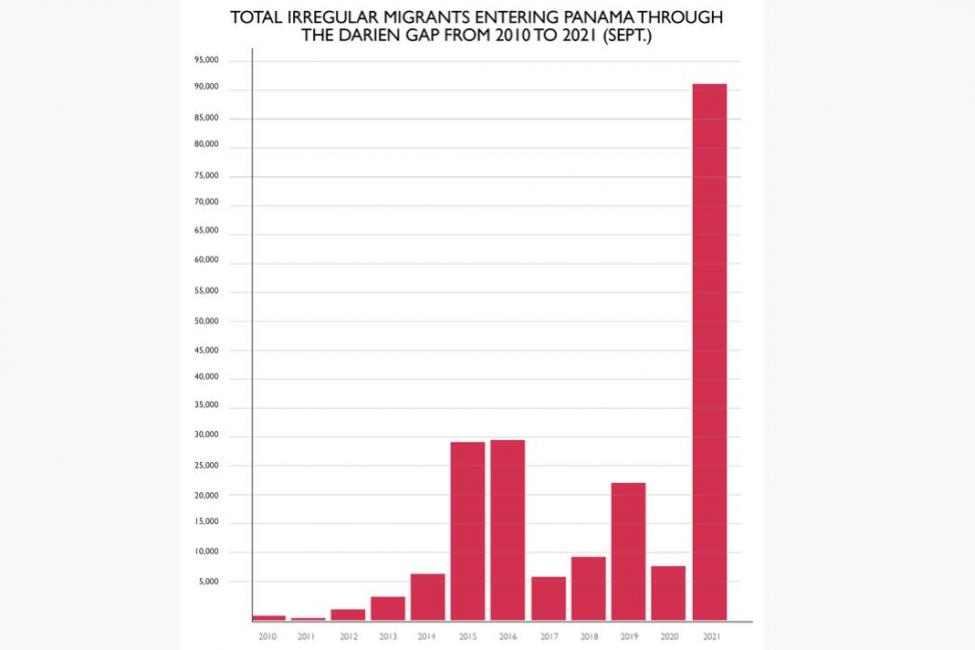-
Who we are
WHO WE AREThe International Organization for Migration (IOM) is part of the United Nations System as the leading inter-governmental organization promoting since 1951 humane and orderly migration for the benefit of all, with 175 member states and a presence in 171 countries.
-
Our Work
Our WorkAs the leading inter-governmental organization promoting since 1951 humane and orderly migration, IOM plays a key role to support the achievement of the 2030 Agenda through different areas of intervention that connect both humanitarian assistance and sustainable development.
What We Do
What We Do
Partnerships
Partnerships
- Where we work
-
Take Action
Take Action
Work with us
Work with us
Get involved
Get involved
- Data and Research
- 2030 Agenda
More Than 91,000 Migrants Have Crossed Darien Gap on Way to North America This Year
Panama City - More than 91,300 migrants, mostly Haitians, have trekked through the perilous Darien Gap jungle to Panama from Colombia this year hoping to reach the United States, Canada or Mexico, according to Panama's National Migration Service (SNM). The figure for the first nine months triples the previous record of 30,000 on the same route during all of 2016.
"Border closures and economic contractions due to the COVID-19 pandemic led to an increase in irregular migration,'' said Santiago Paz, International Organization for Migration (IOM) Chief of Mission in Panama. "Caribbean and extra-regional migrants make the crossing in extremely vulnerable conditions and are exposed to risks along their migratory route, particularly in the crossing of the Darien Gap on the border between Panama and Colombia."
Between January and September 2021, many of the 56,600 Haitian migrants were accompanied by children born during their migratory journey. Migrants also arrive from Cuba (12.8K), Venezuela (1.5K) and dozens of countries in Asia and Africa, including Bangladesh, Senegal, Ghana, Uzbekistan, India and Nepal.
This migration movement slows during the rainy season (between May and July), but this year's figures show an increase despite the weather, which poses extra risks for travellers due to rising rivers.
Migrants often passed through South American countries where they worked for months or even years. In a survey conducted by IOM among 732 migrants arriving at the Migration Reception Stations (ERM) near the border with Colombia, 43 per cent said their country of habitual residence was Chile, and 20 per cent said Brazil. Only 14 per cent said they usually reside in Haiti.
The figures also reveal an increase in the number of migrants of Venezuelan nationality arriving through the Darien route. In 2017, 66 Venezuelans were registered but between January and September 2021, the number was 1,529.
There is also evidence of an increase in the number of minors arriving in Panama through the Darien route. While in 2017 children made up 2 per cent of the migratory movement through the Colombia-Panama border, between January and September of this year they already account for 20 per cent.
"Responding to the needs of migrants transiting irregularly through Panama poses significant challenges mainly related to funding," Paz said. "In this sense, there is an urgent need to redouble coordination between governments and international cooperation to respond to the humanitarian needs of the population in transit."
In recent years, the Panamanian government has created a physical and institutional infrastructure to temporarily house the population in transit and attend to the humanitarian needs of this growing migrant population. With technical support from the IOM and other international organizations, Panama has installed two ERMs, where migrants find lodging and food, and where potential cases of COVID-19 are monitored.
Through technical support to the Government of Panama and its daily presence in the field, IOM has identified needs in the humanitarian assistance provided in the ERMs of Darien, including protection of vulnerable groups, shelter, water and sanitation, and access to health. IOM, along with other UN agencies and international NGOs, is making efforts to complement and improve the humanitarian care provided by the Panamanian government to migrants.
"The situation faced by irregular migrants in transit in the Latin American and Caribbean region must be addressed from a regional approach and cannot be the responsibility of a single country,'' Paz said. "The Global Compact for Safe, Orderly and Regular Migration recommends cooperation among States to respond quickly and coherently to the needs of migrants in vulnerable conditions, and this need for cooperation is especially evident in the Darien."
For more information, please contact Jorge Gallo at the IOM Regional Office for Central America, North America and the Caribbean, email jgallo@iom.int, tel: +506 7203 6536.

